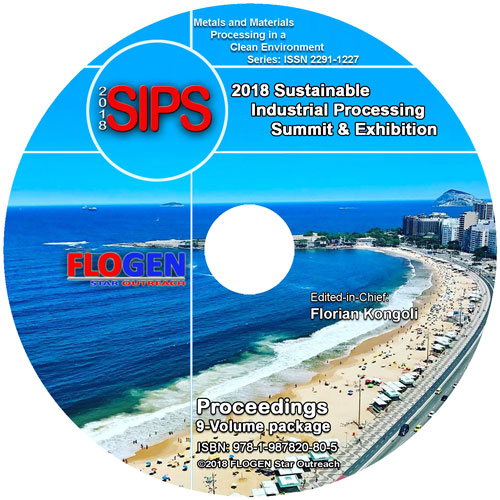2018-Sustainable Industrial Processing Summit
SIPS2018
Volume 6. New and Advanced Materials and Technologies
| Editors: | F. Kongoli, F. Marquis, P. Chen, T. Prikhna, N. Chikhradze |
| Publisher: | Flogen Star OUTREACH |
| Publication date: | 23 December 2018 |
| Pages: | 392 pages |
| ISBN: | 978-1-987820-92-8 |
| ISSN: | 2291-1227 (Metals and Materials Processing in a Clean Environment Series) |

CD shopping page
Process Intensification in Biorefineries – the Way to High Added Value Products
Ludo Diels1;1VITO/UA, Mol, Belgium;
Type of Paper: Keynote
Id Paper: 314
Topic: 43
Abstract:
The global trend towards sustainability and resource efficiency urges us to transform our concept of chemical plants and strive for compact, safe, energy-efficient, and environment-friendly sustainable processes. These developments share a common focus on process intensification.
At the level of core conversion processes in a biorefinery, one way to achieve process intensification entails combining reaction and separation in such a way that the overall result is more sustainable, delivers better product quality, reduces the equipment size, lowers the solvent use both for (i) bioprocesses and (ii) chemical processes. Several bio-based processes are plagued by limited product titers and volumetric productivities due to product inhibition. Other processes suffer from side reactions decreasing the yield of the process. Many enzymatic reactions are characterized by suboptimal reaction equilibria. For such processes, it can be advantageous to invest in a recovery technology that allows the selective separation of the product during fermentation or biocatalysis. In-situ product recovery (ISPR) is a key technology platform to intensify bioprocesses. Specific cases will be presented and the benefits for the selected processes explained. Clever integration of separation technology can also be beneficial for chemical processes requiring high dilution to prevent precipitation or intramolecular reactions or processes that suffer from substrate inhibition. The concept of volume intensified dilution not only allows to get similar or better yields and purities, but also a considerable reduction of solvent use.
In upstream and downstream processing, proper pretreatment of feedstocks to remove inhibitory components and selective separations in downstream processing are essential as well. Bioprocesses have the disadvantage to operate under quite dilute conditions. This means that concentrating the product, re-using the water and desalinating the water are becoming key challenges for the success of future bio-based processes. These challenges will be explained via different examples from practice.